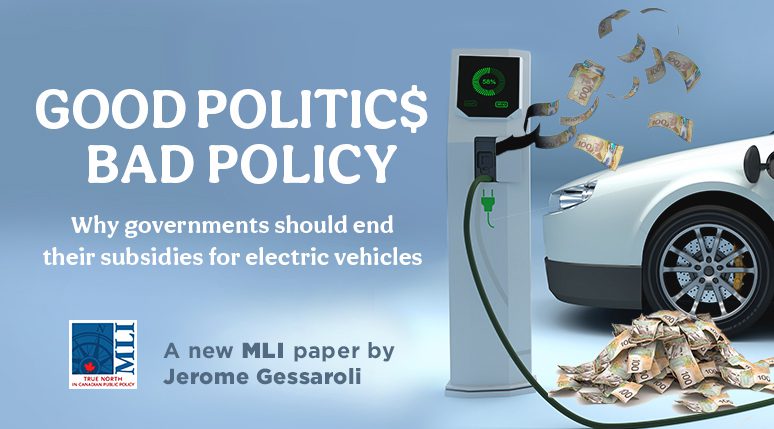 By Jerome Gessaroli
By Jerome Gessaroli
March 16, 2022
Executive Summary
If one believes that climate change is a serious global threat, it is crucial that any policy introduced results in the greatest possible reduction in greenhouse gas (GHG) emissions per dollar spent. One program federal and some provincial governments have embraced is to offer subsidies for those purchasing electric vehicles (EVs), which do not generate any tail-pipe emissions. Encouraging EV sales over traditional gas and diesel-powered vehicles will significantly reduce emissions.
This paper evaluates the subsidy programs Canada offers on EV sales and on purchases of electric charging stations. Specifically, it asks how cost effective these subsidies are in reducing GHG emissions and, given that government pays them out of general tax revenue, how equitable they are for all Canadians to access.
Electric vehicles are expensive – in Canada they cost from $12,500 to $25,000 more than equivalent gas models. Therefore, higher-income households buy a large fraction of EVs sold. That government subsidies mostly benefit higher-income households is troubling. The federal government offers a $5000 subsidy for those purchasing an EV and, from the provincial governments, subsidies range from nothing in four provinces, including Ontario, to $8000 in Quebec. Further subsidies are available for those installing household or commercial charging stations.
A review of several studies indicates an expected average lifetime reduction 28.2 tonnes of GHGs for every new EV purchased over an internal combustion engine (ICE) vehicle. In the absence of subsidies, estimates indicate EV sales will drop by half. Marginally, the federal EV subsidy program on its own costs $355 to reduce 1 tonne in GHGs. Adding in the provincial subsidies, the marginal cost rises to between $512 for Newfoundland and $964 for Quebec per tonne of GHG. The federal government uses a price of $50 per tonne of GHG as its social cost of carbon. So, for every $50 per tonne in benefits (that is, reduced carbon costs), Ottawa and the provinces pay between $512 to $964 per tonne – the subsidy programs are very costly and inefficient.
Governments need to rethink the subsidies they offer for purchasing EVs. Electric vehicle and charging station subsidies are an expensive way to reduce greenhouse gases. In addition, since EV sales are disproportionately to higher-income households, those least needing the subsidies receive money that is paid by tax revenue generated by all taxpayers. Thus, EV and charging station subsidies are a very regressive policy.
The government should let the carbon tax work as intended by refraining from policies like EV subsidies. There are lower cost carbon abatement methods than EV subsidies. They include enhanced methane regulations, large scale solar power, gasoline taxes, and advanced nuclear. The federal government and those provincial governments that currently subsidize EV sales should end their subsidies and focus on more cost-effective GHG emission abatement policies.
Jerome Gessaroli teaches at the British Columbia Institute of Technology and is a Visiting Fellow at the Macdonald-Laurier Institute. He writes on economic and environmental matters from a market-based principles perspective.






